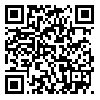Volume 31, Issue 3 (2025)
AIJH 2025, 31(3): 85-114 |
Back to browse issues page
Download citation:
BibTeX | RIS | EndNote | Medlars | ProCite | Reference Manager | RefWorks
Send citation to:



BibTeX | RIS | EndNote | Medlars | ProCite | Reference Manager | RefWorks
Send citation to:
ghafeli J, khezri A, Balavi R, Pour Abed M J, Zare N. Speech Acts and their Communicative Functions in the Poetry of Walid Seif according to Searle's Pragmatic Theory. AIJH 2025; 31 (3) :85-114
URL: http://aijh.modares.ac.ir/article-31-71391-en.html
URL: http://aijh.modares.ac.ir/article-31-71391-en.html
1- PhD Student in Arabic Language and Literature, Persian Gulf University, Bushehr - Iran , j.ghafeli@yahoo.com
2- Associate Professor, Department of Arabic Language and Literature, Persian Gulf University, Bushehr - Iran
3- Professor of Arabic Language and Literature at Persian Gulf University, Bushehr - Iran
4- Associate Professor, Department of Arabic Language and Literature, Persian Gulf University, Bushehr- Iran
2- Associate Professor, Department of Arabic Language and Literature, Persian Gulf University, Bushehr - Iran
3- Professor of Arabic Language and Literature at Persian Gulf University, Bushehr - Iran
4- Associate Professor, Department of Arabic Language and Literature, Persian Gulf University, Bushehr- Iran
Abstract: (1110 Views)
Speech acts are considered as one of the most important foundations of pragmatic analysis by creating an impact on the recipient based on understanding the addressee’s intent, and benefiting the addressee is one of the important goals that cannot be neglected. The speaker chooses vocabulary and arranges it according to the intention he follows in speaking. Austin was able to lay down the main principles of the theory of speech acts, but the theory did not stop there. It expanded and became more mature with the second pioneer in the philosophy of ordinary language, namely the American philosopher John Searle. His tasks were to develop the theory by distinguishing within the sentence between what is related to the action included in the statement itself, which he calls the power included in the statement, and what is related to the content of the action, which he calls the name of propositional content. In this study, we will rely on Searle's opinions and search for the five speech acts affected by context and internal and external factors, used in poetry collections, A Vasham All khzrah, Ghasaed fi zaman Alfath, and Taghribat Bani Palestine by the poet Walid Saif. This study aims to search for speech acts and employ them in Walid Saif’s poetry based on the descriptive-analytical approach. The results indicate that the poet used verbal acts to express positive and negative emotions such as war, love, sadness, nostalgia, coercion, disappointment, waiting, and his hope for the future. Through these speech acts, which were mentioned directly and indirectly, we saw that the poet tends to use the five speech acts to stir feelings and excite the recipient to accomplish an action. The performance verb, both direct and indirect, was evident in poetic discourse, revealing its power within specific linguistic contexts that facilitated the realization of the poet’s verbal intentions and purposes through the words he chose to serve his poetic text.
Article Type: Original Research |
Subject:
Arts and Humanities (General)
Received: 2023/09/4 | Accepted: 2024/05/31 | Published: 2025/03/30
Received: 2023/09/4 | Accepted: 2024/05/31 | Published: 2025/03/30
Send email to the article author
| Rights and permissions | |
 |
This work is licensed under a Creative Commons Attribution-NonCommercial 4.0 International License. |






